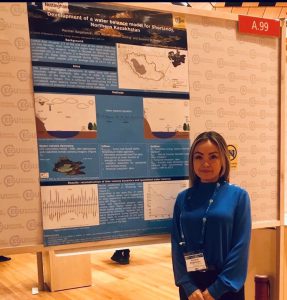
June 26, 2019, by lzzeb
European Geosciences Union (EGU) 2019
A blog by Marzhan Baigaliyeva
In early April 2019, I was very lucky to attend the general assembly of the European Geosciences Union (EGU) which was held in Vienna, Austria. The EGU is the biggest European geoscience union, dedicated to explore Earth, planetary and space sciences for the advantage of humanity worldwide. This year, the conference was bigger than ever, with more than 16 thousand scientists, which most of participants were under the age of 35 years.
My own presentation focused on sharing some preliminary results obtained for my PhD project. The project seeks to understand water circulation in one of the lakes located in Northern Kazakhstan. In the work presented in Vienna, we developed the monthly water volume of Shortandy lake estimated by a water balance model that estimates daily open water and grass evaporation, runoff produced by snowmelt and precipitation, and groundwater flow. We have validated developed water balance model against monthly observed water levels. Derivation of the water balance for Shortandy lake revealed valuable information on regional climate variability between 1986 to 2016 as well as the impact of long human activities from surface and groundwater abstraction.
Our project is the first attempt to study water circulation in Northern Kazakhstan by utilizing numerical models. Thus, it is crucial to be updated with current research dedicated to lakes hydrology worldwide. The EGU gave me a great opportunity to built-up interaction with people who are dealing with similar research projects. My particular interest was to visit a number of sessions devoted to quantify a runoff produced by snowmelt as well as how future climate will be affecting interannual variability of main hydrological drivers in Central Asia. In addition, the conference also gave me a chance to understand other research methods applicable for lakes modelling.
To sum up, I think the EGU it is a nice conference for early stage researchers. In addition, it a nice platform for sharing your research ideas and sometimes to address our concerns/problems with your project. Also, it is a great opportunity to create networking with other researchers from different parts of the world.
No comments yet, fill out a comment to be the first


Leave a Reply